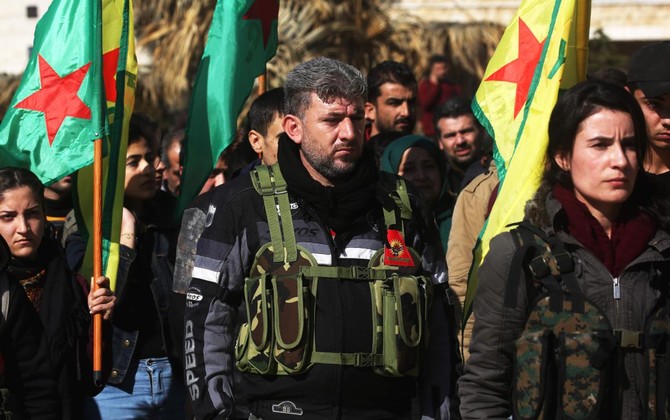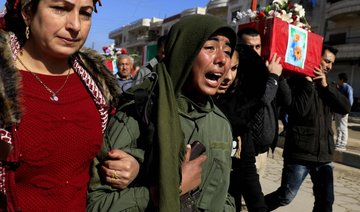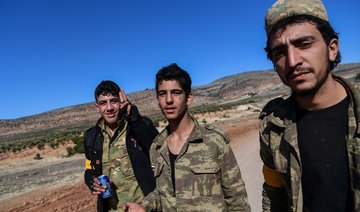ALEPPO, Syria/BEIRUT: Syria’s US-backed Kurds are getting indirect help from an unlikely source in their war against Turkey in the northwestern region of Afrin: President Bashar Assad.
Pro-government forces and Kurdish-led forces have fought each other elsewhere in Syria and Damascus opposes the Kurds’ demands for autonomy. But in Afrin they have a common enemy and a mutual interest in blocking Turkish advances.
Turkey, which regards the Kurdish YPG militia in Afrin as a threat on its southern border, launched an assault on the region last month. Seeking to shield Afrin, the Kurds asked Damascus to send forces into action to defend the border.
The government shows no sign of doing so, but it is providing indirect help by allowing Kurdish fighters, civilians and politicians to reach Afrin through territory it holds, representatives of both sides told Reuters.
Assad stands to gain while doing little.
The arrival of reinforcements is likely to sustain Kurdish resistance, bog down the Turkish forces and prolong a conflict that is sapping the resources of military powers that rival him for control of Syrian territory.
For the United States, it is yet another complication in Syria’s seven-year-old war, and a reminder of how its Syrian Kurdish ally must at times make deals with Assad even as it builds military ties with the United States.
Lacking international protection, the Kurdish-led forces in northern Syria say they have reached agreements with Damascus to allow reinforcements to be sent to Afrin from other Kurdish-dominated areas — Kobani and the Jazeera region.
“There are different ways to get reinforcements to Afrin but the fundamental route is via regime forces. There are understandings between the two forces ... for the sake of delivering reinforcements to Afrin,” Kino Gabriel, spokesman for the Kurdish-dominated Syrian Democratic Forces (SDF), said.
While the Kurds depend on Assad to reach Afrin, Kurdish sources say they also enjoy leverage over Damascus because it needs their cooperation to source grain and oil from areas of the northeast under Kurdish control.
A commander in the military alliance fighting in support of Assad said “the Kurds have no option but coordination with the regime” to defend Afrin.
“The Syrian regime is helping the Kurds with humanitarian support and some logistics, like turning a blind eye and allowing Kurdish support to reach some fronts,” said the commander, who spoke on condition of anonymity.
Turkish campaign moves slowly
The Turkish military is making slow gains nearly three weeks into the operation it calls “Olive Branch.”
Ankara views the YPG as an extension of the Kurdistan Workers’ Party (PKK), which has fought a three-decade insurgency in Turkey and is regarded as a terrorist group by the United States and the European Union.
The United States has relied on the YPG as a vital ground component of its war against Daesh, and has backed the group in other Kurdish-run regions in northern Syria along the border with Turkey.
But US forces are not in Afrin, so have been unable to shield Afrin from the attack by Turkey, its NATO ally.
The Kurds meanwhile accuse Russia of giving a green light for the Turkish attack by withdrawing observers it deployed in Afrin last year.
The Afrin war marks another twist in the complicated story of relations between Assad and the Syrian Kurdish groups, spearheaded by the YPG, that have carved out autonomous regions in northern Syria since the war began in 2011.
The YPG controls nearly all of Syria’s frontier with Turkey. But Afrin is separated from the bigger Kurdish-controlled region further east by a 100 km-wide zone controlled by the Turkish military and its Syrian militia allies.
For much of the war, Damascus and the YPG have avoided confrontation, at times fighting common enemies, including the rebel groups that are now helping Turkey attack Afrin.
But tensions have mounted in recent months, with Damascus threatening to march into parts of eastern and northern Syria captured by the SDF with support from the US-led coalition.
Underlining that, pro-Syrian government forces attacked the SDF in the eastern province of Deir Ezzor, drawing coalition air strikes overnight that killed more than 100 of the attackers, the coalition said.
“The regime has allowed the YPG to bring people into Afrin, while attacking it east of Euphrates (River). I think that is indicative of the state of relations right,” said Noah Bonsey, International Crisis Group’s Senior Analyst on Syria.
He added: “There is still a significant gap between the YPG and regime positions on the future of northeastern Syria.”
Fighting for Afrin
The main Syrian Kurdish groups remain wedded to their vision of a Syria where they enjoy autonomy in a form of federalism that is at odds with Assad’s determination to recover all Syria.
Each side has allowed the other to maintain footholds in its territory. In Kurdish-held Qamishli, the government still controls the airport. In the Sheikh Maqsoud district of Aleppo, a government city, Kurdish security forces patrol the streets.
Scores of Kurds from Sheikh Maqsoud have gone to Afrin to support the fight, Kurdish officials there said. The short journey requires movement through areas held by the government or its Iran-backed Shiite militia allies.
“Of course people went from Sheikh Maqsoud — in the hundreds — to bear arms and defend Afrin,” said Badran Himo, a Kurdish official from Sheikh Maqsoud.
“Around 10 of them were martyred (killed),” he told Reuters as Kurdish security forces held a rally to commemorate one of the dead.
Earlier this week, witnesses say a civilian convoy of hundreds of cars drove to Afrin from other Kurdish-held areas in a show of solidarity.
The Syrian government has ignored appeals by the Kurdish authorities to guard the Syrian border at Afrin.
“We tried to convince them, via the Russians, to at least protect the borders, to take a position, but we did not reach (get?) a result,” Aldar Khalil, a top Kurdish politician, told Reuters.
“If they don’t protect the borders, then at least they don’t have the right to block the way for Syrian patriots who are protecting these borders, regardless of other domestic issues.”
Friend or foe? Assad quietly aids Syrian Kurds against Turkey
Friend or foe? Assad quietly aids Syrian Kurds against Turkey

Israeli strikes hit Yemen’s Sanaa and Hodeidah, Houthis’ Al Masirah TV says

- Houthis said that multiple air raids targeted an airport, military air base and a power station in Yemen
JERUSALEM: Multiple air raids hit several targets in Houthi-held areas of Yemen on Thursday, witnesses and the militia said, with their media saying Israel launched the strikes.
Sanaa airport and the adjacent Al-Dailami base were targeted along with a power station in Hodeida, in attacks that the Houthis’ Al-Masirah TV channel called “Israeli aggression.”
There was no immediate comment from Israel on the strikes, which come a day after Yemen fired a ballistic missile and two drones at Israel.
On Saturday, a Houthi missile attack left 16 people wounded in Tel Aviv.
Saturday’s incident had prompted a warning from Israeli Prime Minister Benjamin Netanyahu, who said he had ordered the destruction of Houthi infrastructure.
“I have instructed our forces to destroy the infrastructure of Houthis because anyone who tries to harm us will be struck with full force,” Netanyahu said in parliament.
“We will continue to crush the forces of evil with strength and ingenuity, even if it takes time.”
Syria authorities say torched 1 million captagon pills

DAMASCUS: Syria’s new authorities torched a large stockpile of drugs on Wednesday, two security officials told AFP, including one million pills of captagon, whose industrial-scale production flourished under ousted president Bashar Assad.
Captagon is a banned amphetamine-like stimulant that became Syria’s largest export during the country’s more than 13-year civil war, effectively turning it into a narco state under Assad.
“We found a large quantity of captagon, around one million pills,” said a balaclava-wearing member of the security forces, who asked to be identified only by his first name, Osama, and whose khaki uniform bore a “public security” patch.
An AFP journalist saw forces pour fuel over and set fire to a cache of cannabis, the painkiller tramadol, and around 50 bags of pink and yellow captagon pills in a security compound formerly belonging to Assad’s forces in the capital’s Kafr Sousa district.
Captagon has flooded the black market across the region in recent years, with oil-rich Saudi Arabia a major destination.
“The security forces of the new government discovered a drug warehouse as they were inspecting the security quarter,” said another member of the security forces, who identified himself as Hamza.
Authorities destroyed the stocks of alcohol, cannabis, captagon and hashish in order to “protect Syrian society” and “cut off smuggling routes used by Assad family businesses,” he added.
Syria’s new Islamist rulers have yet to spell out their policy on alcohol, which has long been widely available in the country.
Since an Islamist-led rebel alliance toppled Assad on December 8 after a lightning offensive, Syria’s new authorities have said massive quantities of captagon have been found in former government sites around the country, including security branches.
AFP journalists in Syria have seen fighters from Islamist group Hayat Tahrir Al-Sham (HTS) set fire to what they said were stashes of captagon found at facilities once operated by Assad’s forces.
Security force member Hamza confirmed Wednesday that “this is not the first initiative of its kind — the security services, in a number of locations, have found other warehouses... and drug manufacturing sites and destroyed them in the appropriate manner.”
Maher Assad, a military commander and the brother of Bashar Assad, is widely accused of being the power behind the lucrative captagon trade.
Experts believe Syria’s former leader used the threat of drug-fueled unrest to put pressure on Arab governments.
A Saudi delegation met Syria’s new leader Ahmed Al-Sharaa in Damascus on Sunday, a source close to the government told AFP, to discuss the “Syria situation and captagon.”
Jordan in recent years has also cracked down on the smuggling of weapons and drugs including captagon along its 375-kilometer (230-mile) border with Syria.
Jordan says 18,000 Syrians returned home since Assad’s fall

AMMAN: About 18,000 Syrians have crossed into their country from Jordan since the government of Bashar Assad was toppled earlier this month, Jordanian authorities said on Thursday.
Interior Minister Mazen Al-Faraya told state TV channel Al-Mamlaka that “around 18,000 Syrians have returned to their country between the fall of the regime of Bashar Assad on December 8, 2024 until Thursday.”
He said the returnees included 2,300 refugees registered with the United Nations.
Amman says it has hosted about 1.3 million Syrians who fled their country since civil war broke out in 2011, with 650,000 formally registered with the United Nations.
Lebanon hopes for neighborly relations in first message to new Syria government

- Lebanon’s Iran-backed Hezbollah played a major part propping up Syria’s ousted President Bashar Assad through years of war
- Syria’s new Islamist de-facto leader Ahmed Al-Sharaa is seeking to establish relations with Arab and Western leaders
DUBAI: Lebanon said on Thursday it was looking forward to having the best neighborly relations with Syria, in its first official message to the new administration in Damascus.
Lebanese Foreign Minister Abdallah Bou Habib passed the message to his Syrian counterpart, Asaad Hassan Al-Shibani, in a phone call, the Lebanese Foreign Ministry said on X.
Lebanon’s Iran-backed Hezbollah played a major part propping up Syria’s ousted President Bashar Assad through years of war, before bringing its fighters back to Lebanon over the last year to fight in a bruising war with Israel – a redeployment which weakened Syrian government lines.
Under Assad, Hezbollah used Syria to bring in weapons and other military equipment from Iran, through Iraq and Syria and into Lebanon. But on Dec. 6, anti-Assad fighters seized the border with Iraq and cut off that route, and two days later, Islamist militants captured the capital Damascus.
Syria’s new Islamist de-facto leader Ahmed Al-Sharaa is seeking to establish relations with Arab and Western leaders after toppling Assad.
Iraqi intelligence chief discusses border security with new Syrian administration

BAGHDAD: An Iraqi delegation met with Syria’s new rulers in Damascus on Thursday, an Iraqi government spokesman said, the latest diplomatic outreach more than two weeks after the fall of Bashar Assad’s rule.
The delegation, led by Iraqi intelligence chief Hamid Al-Shatri, “met with the new Syrian administration,” government spokesman Bassem Al-Awadi told state media, adding that the parties discussed “the developments in the Syrian arena, and security and stability needs on the two countries’ shared border.”















